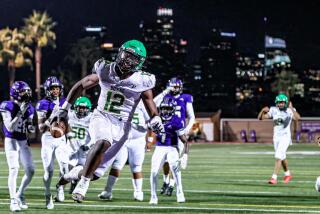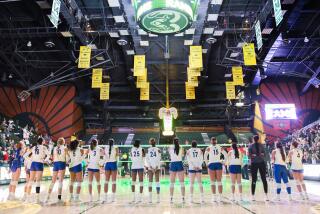Titan Football Players Discuss Game Boycott : Dispute: Worried about financial aid, program’s future, they ponder skipping Southwestern Louisiana.
- Share via
FULLERTON — Cal State Fullerton football players, frustrated over the uncertainty of the program’s future, are considering a boycott of the Oct. 17 game at Southwestern Louisiana as a way to pressure school President Milton A. Gordon into making a quick decision about the sport’s fate.
Coach Gene Murphy called off practice Wednesday after players met with Athletic Director Bill Shumard to discuss several issues, most prominent of which was the future of Titan football.
Players are concerned about how long their scholarships will be honored if football is dropped. They’re concerned about having scholarships pulled if the program is downgraded and grants reduced. And they’re concerned about the status of their financial aid for next semester.
Gordon has said that a decision on whether the Titans remain Division I-A, drop to a reduced I-AA program or eliminate the sport altogether will come after the season. But players, especially underclassmen, say they want to know sooner so they can begin making plans.
There was talk of boycotting Saturday’s game at San Jose State, but the team decided it will return to practice today and play.
A decision about the Southwestern Louisiana game won’t be made until players meet with Gordon Monday afternoon, several Titans said.
“I want to play, but it comes down to how many people feel strong enough about using a boycott as a tool to get a decision,” said senior tight end Robert Bedford, who has acted as a team representative in several meetings with Shumard this week. “There’s a possibility, because everyone is upset about the situation.”
Some players believe the team’s potential to affect the athletic department budget--Fullerton is to receive about $90,000 for the Southwestern Louisiana game and about $35,000 for each of four Big West Conference road games--gives them some leverage. Jilted opponents could also ask for compensation for lost revenue, increasing Fullerton’s losses.
“There’s $250,000 more (actually about $230,000) to get out of the season, and they want us to play out the schedule so they can complete their budget,” sophomore running back Reggie Carter said. “They want to make sure their estimates are accurate, so by us boycotting, it gives us more power.”
Shumard said such a move would be senseless, though, because boycotting would likely breach the players’ scholarship agreement. Gordon wasn’t available for comment, but Shumard, who met briefly with Gordon Wednesday, said there was no reason to believe the president will make any decisions by next week.
“The president has always made his timeline known, and I don’t think any one segment of the university will dictate how and when his decision will be made,” Shumard said. “I think it would be foolish (to boycott) because the ramifications to the players would be critical.”
Word began to circulate among players last week that, because of financial problems, their scholarships would only be honored for the current (fall) semester. But Shumard told players Wednesday that their financial aid will continue through the spring.
“Everyone was satisfied with that answer,” Bedford said. “The main concern with players is: Are they going to get what they were promised when they came here--everyone wants to know if their education will be paid for until they graduate.”
This will likely be a major point of contention between players and Gordon on Monday, and with Fullerton coaches and administrators in the coming months.
NCAA bylaws state that financial aid is not to be awarded for more than one academic year at a time.
But the rule also allows for a staff member “to inform a prospect that the athletic department will recommend to the financial aid authority that the prospect’s financial aid be renewed each year for a period of four years and may indicate that the authority always has followed the athletic department’s recommendation in the past. However, the prospect must be informed that the renewal will not be automatic.”
This allows a coach to make a good-faith commitment to an athlete that he’ll have a four-year scholarship if he remains in good athletic and academic standing.
Fullerton football players on scholarship entered school under the impression financial aid would continue through their senior seasons. That’s what the coaches told them.
But if football is dropped or downgraded, and grants must be reduced or eliminated, school administrators will likely argue that they are only financially committed for one-year periods.
It will boil down to how the NCAA rules are interpreted and what constitutes good faith in the eyes of administrators and coaches.
“All I can say is there’s a disagreement with some of the players on the team and the president of the university,” senior linebacker Mike Gullo said.
More to Read
Go beyond the scoreboard
Get the latest on L.A.'s teams in the daily Sports Report newsletter.
You may occasionally receive promotional content from the Los Angeles Times.











